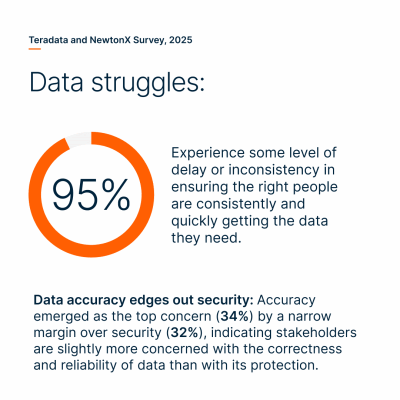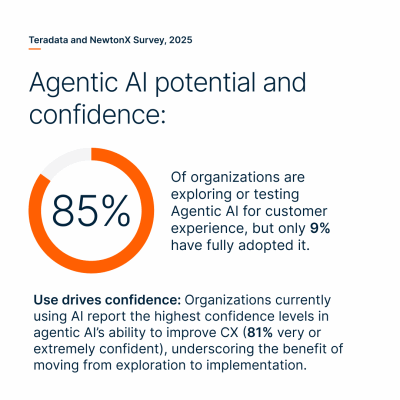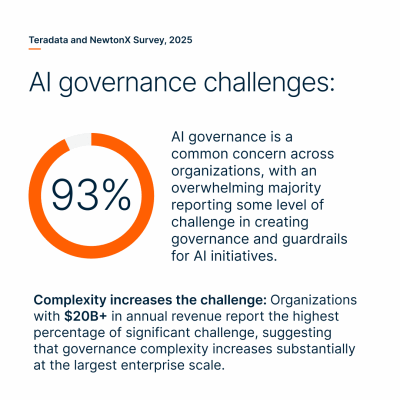A Teradata–NewtonX survey reveals C-suite optimism in AI’s CX potential—but data, governance, and “prove it first” mindsets slow real progress.
In a business landscape where customer experience (CX) is a key differentiator, executives are navigating the complex challenge of harnessing AI to drive meaningful impact. Most leaders see potential in advanced technologies, including agentic AI, with 74% expressing moderate to great confidence in its ability to improve CX. Despite that optimism, they are also grappling with the operational realities of effectively implementing AI technologies. This explains the current paradox: While organizations are ready to invest in cutting-edge AI, they are held back by issues with data access, accuracy, security, and governance along with cautious “prove it first” mindsets.
 A new survey of C-suite executives and AI leaders shows that enterprise decision-makers have a strong commitment to enhancing CX through AI technologies but face multiple hurdles. Conducted for Teradata by NewtonX, a leading global B2B market research company, the survey reveals that many leaders lack confidence in their organizations’ ability to create effective governance frameworks, have limited success in meeting regulatory requirements, and struggle with necessary data access. This suggests that while there is general trust in AI’s potential, executives face significant practical challenges with the implementation and governance needed to ensure reliability and compliance.
A new survey of C-suite executives and AI leaders shows that enterprise decision-makers have a strong commitment to enhancing CX through AI technologies but face multiple hurdles. Conducted for Teradata by NewtonX, a leading global B2B market research company, the survey reveals that many leaders lack confidence in their organizations’ ability to create effective governance frameworks, have limited success in meeting regulatory requirements, and struggle with necessary data access. This suggests that while there is general trust in AI’s potential, executives face significant practical challenges with the implementation and governance needed to ensure reliability and compliance.
“Organizations across the world are embracing AI, but the adoption of autonomous AI presents new difficulties to contend with,” said Aditi Uppal, Vice President of Digital Marketing and Demand Generation at Teradata. “Data challenges, operational hurdles, and trust considerations raise the bar considerably, but our survey also shows that business decision-makers overwhelmingly expect agentic AI will improve customer experience and deliver ROI.”
AI’s Great Expectations
AI is now mainstream with nearly all organizations (99%) having already implemented some form of AI. Two out of three expect to see results from AI within six months or less, reflecting high expectations for rapid ROI.
The survey shows a particularly strong commitment to enhancing CX through AI with 43% in the consideration phase and over a third (34%) actively trialing agentic AI solutions.

Over three-quarters are planning to increase spending in this area, and more than half the companies surveyed anticipate generating at least $1 million in revenue or cost savings from their AI for CX initiatives. This includes more than a third of organizations (36%) that expect financial benefits of over $2.5 million.
Confidence in Agentic AI Potential
Agentic AI may soon reach its moment: The technology has achieved market awareness and interest with a significant majority of organizations (85%) considering, evaluating, or currently using Agentic AI for customer experience. Although only 9% have fully adopted agentic AI, nearly three-quarters (74%) of respondents express moderate to high confidence in its potential, suggesting positive expectations despite the early adoption stages. Organizations currently using AI report the highest confidence levels in agentic AI’s ability to improve CX (81% were either ‘very’ or ‘extremely’ confident), underscoring the benefit of moving from exploration to implementation.
AI Governance and Data Access Hurdles Persist
Organizations reported a complex mix of AI implementation barriers, including governance challenges, data access issues, and a widespread skills gap, with only 13% of respondents indicating they currently have the skills needed to advance AI initiatives.

Governance has emerged as a nearly universal challenge: An overwhelming majority (93%) report some level of challenge in creating governance and guardrails for AI initiatives. Organizations with over $20 billion in annual revenue report the highest percentage of significant challenges (42%), indicating that governance complexity increases substantially at the largest enterprise scale.
Data is another multi-factor concern, and inconsistent data access is a common issue. Despite high expectations, only 4% of organizations report that the right people are consistently and quickly getting the data they need, with the vast majority (96%) experiencing some level of delay or inconsistency. Data accuracy emerged as a top concern (34%), narrowly surpassing security (32%), indicating that stakeholders are slightly more concerned with the correctness and reliability of data than with its protection.
Prove-It-First Mentality Slows Enterprise AI Adoption
As AI solutions have become more widespread, their limitations are increasingly apparent. Multiple stakeholders are raising concerns over AI, particularly legal/compliance teams (75%), and IT/security (75%), with leadership (55%) not far behind. Only 2.2% of respondents reported that no one was raising trust concerns.
Compared with 2024 findings, companies in the 2025 survey are more measured in embracing new solutions. Rather than rushing to be first movers, they increasingly want to see innovations validated before committing. More than a third (35%, up from 22%) now prefer to wait until solutions are proven, reflecting a shift toward balancing innovation with risk management instead of chasing the hype that defined 2024. Even so, over half of those who responded report that they are willing to get in early to begin building a competitive position.










